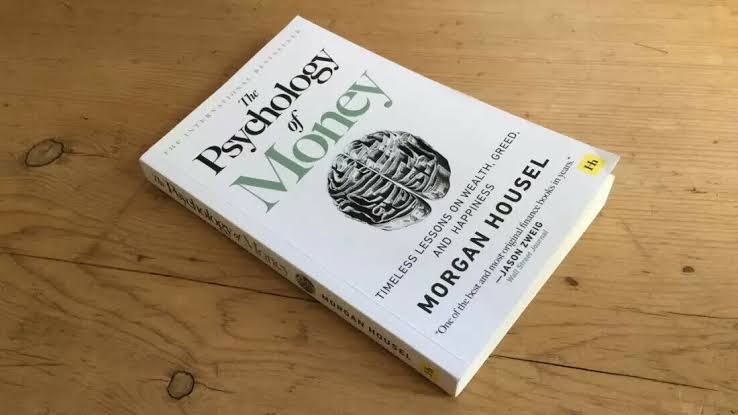

If you’re looking for a finance book that goes beyond investment tips and money management strategies to explore the profound psychological forces driving our financial decisions, The Psychology of Money by Morgan Housel is a must-read. Morgan Housel, a former columnist at The Motley Fool and The Wall Street Journal, takes readers on a journey through the nuances of personal finance, focusing on the human aspects of wealth, greed, and happiness rather than purely technical or theoretical advice.
Overview
The Psychology of Money is a collection of 20 concise essays that tackle different perspectives on how money impacts our decisions and the unique, sometimes irrational, relationship each person has with wealth. Housel delves into the human side of money – why we desire it, how we use it, and how our upbringing, emotions, and personal beliefs shape our financial choices.
Key Themes and Insights
1. Money is a Behavior Game, Not Just a Knowledge Game Housel emphasizes that wealth-building is less about your income level or investment returns and more about your ability to control your behavior. He argues that financial success isn’t about making the “perfect” investment but about consistency, patience, and controlling impulses. For example, it’s less important to hit it big with risky stocks than to avoid major losses by staying consistent and steady.
2. The Power of Compounding One of the standout messages in The Psychology of Money is the magic of compounding. Housel uses the example of Warren Buffett, explaining that his vast wealth isn’t just because he’s a great investor but because he has been consistently investing since he was very young. The simple idea that wealth builds wealth, given time and patience, is reinforced repeatedly throughout the book.
3. The Role of Luck and Risk Housel reminds readers that luck and risk play significant roles in financial success and failure. He highlights that we often overlook the role of luck when someone succeeds, focusing only on their hard work or unique strategies. Conversely, we may ignore that some failures are just the result of unfortunate events, not necessarily bad decisions. This perspective encourages readers to be humble in their successes and empathetic toward others’ failures.
4. Living Below Your Means Instead of encouraging a mindset of endless accumulation, Housel stresses the importance of financial independence and living below one’s means. He asserts that real wealth isn’t about having more money; it’s about having fewer desires and being able to enjoy a fulfilling life with what you already have. The ultimate goal, according to Housel, is to reach a point of financial freedom where money doesn’t control your life but enables it.
5. The Importance of a Financial Safety Net Housel advocates for having an emergency fund or “room for error” in finances. He advises readers to save for unpredictable life events or market downturns. This approach doesn’t necessarily maximize returns in the short term but ensures that one’s financial journey can withstand rough patches. For Housel, “wealth is what you don’t see” – meaning true wealth lies in having security, not flashy purchases.
6. The Illusion of Control The book also dives into the “illusion of control” over investments. Many people, especially during market booms, believe they have mastered investing. But Housel warns against this overconfidence, as markets are unpredictable and influenced by countless variables. Instead of over-optimizing or trying to “time the market,” he advises people to adopt a long-term, consistent approach.
Writing Style and Structure
Morgan Housel’s writing is clear, relatable, and accessible even to those unfamiliar with finance. He uses storytelling and real-world examples, making complex concepts easy to digest. Each essay is self-contained, making it a flexible read; you can pick up and read any chapter individually. The structure keeps the content fresh and engaging, avoiding the dryness that’s sometimes typical of finance books.
Critique
While The Psychology of Money is a powerful book, some readers may find that Housel’s focus on behavioral finance lacks concrete, actionable advice for investing. Housel avoids in-depth discussions on specific investment strategies, leaving readers to apply the mindset shifts he discusses on their own. Additionally, some of the concepts may feel repetitive as the book progresses, although this repetition reinforces the main ideas.
Final Verdict
The Psychology of Money is an enlightening read for anyone interested in understanding the psychology that influences financial decisions. It doesn’t give quick-fix solutions but instead offers timeless wisdom for managing money and building a healthier relationship with wealth. By examining the roles of luck, patience, and behavior, Morgan Housel shows that building wealth and financial freedom is more about mastering oneself than outsmarting the market.
Whether you’re a seasoned investor or just beginning your financial journey, The Psychology of Money is full of insights that will help you think differently about money and the factors that drive financial happiness. It’s a highly recommended read for anyone who wants to gain a fresh perspective on personal finance and wealth management.
RELATED POSTS
View all

